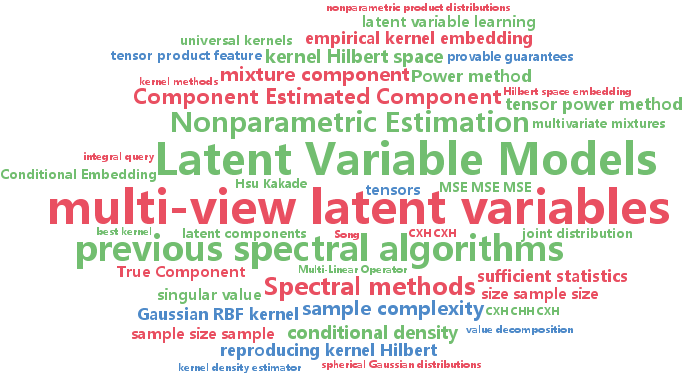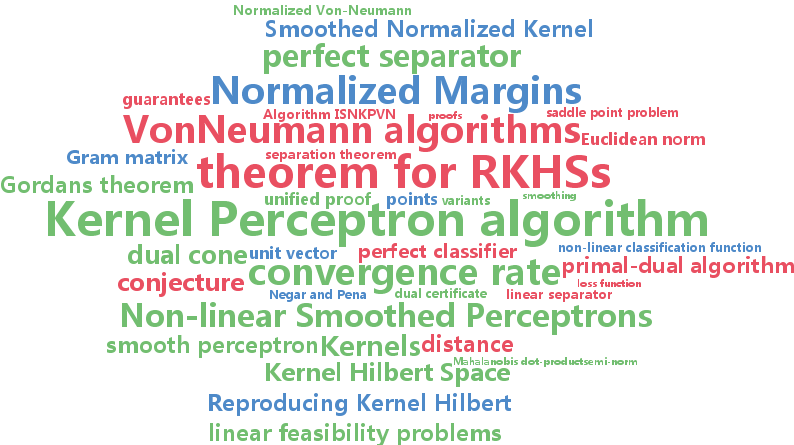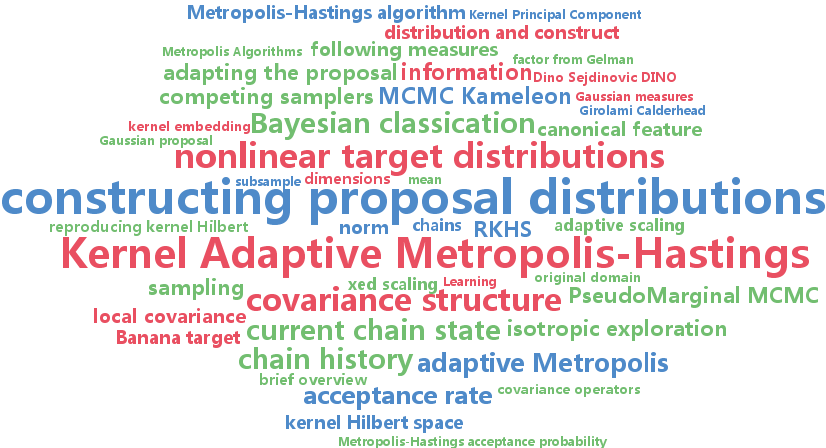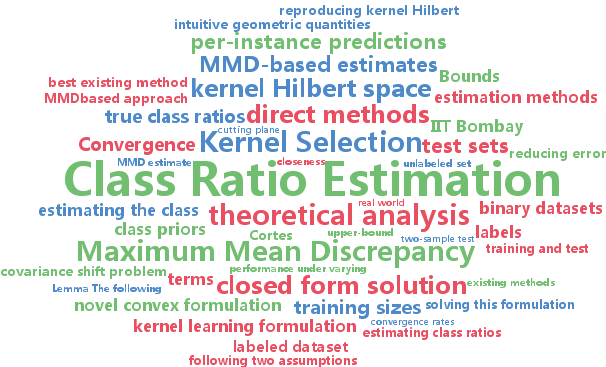kernel hilbert space
-
Le Song and Animashree Anandkumar and Bo Dai and Bo Xie
Nonparametric Estimation of Multi-View Latent Variable Models (pdf)
Spectral methods have greatly advanced the estimation of latent variable models, generating a sequence of novel and efficient algorithms with strong theoretical guarantees. However, current spectral algorithms are largely restricted to mixtures of discrete or Gaussian distributions. In this paper, we propose a kernel method for learning multi-view latent variable models, allowing each mixture component to be nonparametric and learned from data in an unsupervised fashion. The key idea of our method is to embed the joint distribution of a multi-view latent variable model into a reproducing kernel Hilbert space, and then the latent parameters are recovered using a robust tensor power method. We establish that the sample complexity for the proposed method is quadratic in the number of latent components and is a low order polynomial in the other relevant parameters. Thus, our nonparametric tensor approach to learning latent variable models enjoys good sample and computational efficiencies. As a special case of our framework, we also obtain a first unsupervised conditional density estimator of the kind with provable guarantees. In both synthetic and real world datasets, the nonparametric tensor power method compares favorably to EM algorithm and other spectral algorithms.
-
Aaditya Ramdas and Javier Peña
Margins, Kernels and Non-linear Smoothed Perceptrons (pdf)
We focus on the problem of finding a non-linear classification function that lies in a Reproducing Kernel Hilbert Space (RKHS) both from the primal point of view (finding a perfect separator when one exists) and the dual point of view (giving a certificate of non-existence), with special focus on generalizations of two classical schemes - the Perceptron (primal) and Von-Neumann (dual) algorithms. We cast our problem as one of maximizing the regularized normalized hard-margin ($\rho$) in an RKHS and %use the Representer Theorem to rephrase it in terms of a Mahalanobis dot-product/semi-norm associated with the kernel's (normalized and signed) Gram matrix. We derive an accelerated smoothed algorithm with a convergence rate of $\tfrac{\sqrt {\log n
-
Dino Sejdinovic and Heiko Strathmann and Maria Lomeli Garcia and Christophe Andrieu and Arthur Gretton
Kernel Adaptive Metropolis-Hastings (pdf)
A Kernel Adaptive Metropolis-Hastings algorithm is introduced, for the purpose of sampling from a target distribution with strongly nonlinear support. The algorithm embeds the trajectory of the Markov chain into a reproducing kernel Hilbert space (RKHS), such that the feature space covariance of the samples informs the choice of proposal. The procedure is computationally efficient and straightforward to implement, since the RKHS moves can be integrated out analytically: our proposal distribution in the original space is a normal distribution whose mean and covariance depend on where the current sample lies in the support of the target distribution, and adapts to its local covariance structure. Furthermore, the procedure requires neither gradients nor any other higher order information about the target, making it particularly attractive for contexts such as Pseudo-Marginal MCMC. Kernel Adaptive Metropolis-Hastings outperforms competing fixed and adaptive samplers on multivariate, highly nonlinear target distributions, arising in both real-world and synthetic examples.
-
Arun Iyer and Saketha Nath and Sunita Sarawagi
Maximum Mean Discrepancy for Class Ratio Estimation: Convergence Bounds and Kernel Selection (pdf)
In recent times, many real world applications have emerged that require estimates of class ratios in an unlabeled instance collection as opposed to labels of individual instances in the collection. In this paper we investigate the use of maximum mean discrepancy (MMD) in a reproducing kernel Hilbert space (RKHS) for estimating such ratios. First, we theoretically analyze the MMD-based estimates. Our analysis establishes that, under some mild conditions, the estimate is statistically consistent. More importantly, it provides an upper bound on the error in the estimate in terms of intuitive geometric quantities like class separation and data spread. Next, we use the insights obtained from the theoretical analysis, to propose a novel convex formulation that automatically learns the kernel to be employed in the MMD-based estimation. We design an efficient cutting plane algorithm for solving this formulation. Finally, we empirically compare our estimator with several existing methods, and show significantly improved performance under varying datasets, class ratios, and training sizes.



